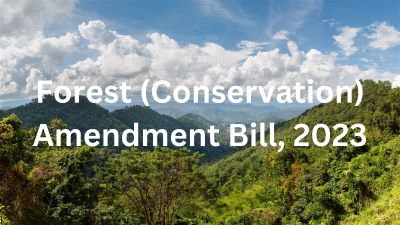Context-
In compliance with a February 19, 2024, Supreme Court order, the Ministry of Environment, Forests and Climate Change (MoEFCC) uploaded the various State Expert Committee (SEC) reports on its website earlier in April. This interim order was in response to a public interest litigation challenging the constitutionality of the Forest (Conservation) Act Amendment (FCAA) 2023. A key concern in the petition was that the status of unclassed forests, which were to be identified by the SEC reports, wasn’t known or if they had been identified at all.
Understanding the Forest (Conservation) Act Amendment (FCAA) 2023
The Forest (Conservation) Act Amendment (FCAA) 2023 marks a significant shift in the legal framework concerning forest protection in India. With its enactment, unclassed forests, which previously enjoyed legal protection under the landmark T.N. Godavarman Thirumalpad (1996) case, are at risk of losing this safeguard. This amendment, therefore, holds profound implications for India's forest ecosystems and ecological security.
The FCAA mandates that unclassed forests, also known as deemed forests, would require the approval of the Central government if a project proponent sought to divert the land for non-forest use. However, the enforcement of this amendment hinges on the identification and documentation of unclassed forests by the State Expert Committees (SECs). These committees were tasked with delineating and assessing unclassed forests, thereby determining their legal status and protection under the amended Act.
Criticism Against the Amended Act
Despite the purported intentions behind the Forest (Conservation) Act Amendment (FCAA) 2023, it has faced significant criticism, particularly regarding its potential impact on forest conservation and management. One of the primary criticisms revolves around the perceived dilution of the protections afforded to unclassed forests, as established by the Godavarman judgment of 1996.
The amendment's detractors argue that by subjecting unclassed forests to potential diversion without adequate safeguards, the FCAA undermines decades of conservation efforts and jeopardizes India's rich biodiversity. Furthermore, concerns have been raised regarding the lack of transparency and accountability in the identification and documentation process of unclassed forests by the State Expert Committees.
Status of Unclassed Forest Identification
The identification and documentation of unclassed forests by the State Expert Committees (SECs) have been marred by significant challenges and shortcomings. Despite the Supreme Court's directives and the imperative nature of this task, no state has provided verifiable data on the identification, status, and location of unclassed forests.
Furthermore, seven States and Union Territories, including Goa, Haryana, Jammu & Kashmir, Ladakh, Lakshadweep, Tamil Nadu, and West Bengal, have seemingly failed to constitute the SEC altogether. Among the states that have shared their reports, only 17 out of 23 are deemed to be in line with the Court's directives, highlighting widespread non-compliance and inadequacies in the process.
Inadequacies in SEC Reports
The SEC reports, upon examination, reveal numerous inadequacies and deficiencies, raising questions about their reliability and accuracy. Many states have merely provided partial or incomplete data, failing to delineate the extent and boundaries of unclassed forests effectively.
Moreover, the lack of geographical information and on-ground verification further undermines the credibility of these reports. The reliance on outdated or incomplete records, coupled with the absence of physical surveys, casts doubts on the authenticity and comprehensiveness of the data presented.
Potential Environmental Implications
The hasty and incomplete identification of unclassed forests, coupled with the enactment of the Forest (Conservation) Act Amendment (FCAA) 2023, poses significant environmental risks and consequences. The loss of legal protection for unclassed forests could lead to their widespread diversion for non-forest purposes, thereby exacerbating deforestation and habitat loss.
Furthermore, the lack of accurate baseline data and monitoring mechanisms impedes efforts to assess the extent of forest loss and its ecological impacts. The failure to uphold the principles outlined in the Godavarman judgment and the Indian Forest Policy jeopardizes India's biodiversity conservation goals and ecological sustainability.
Call for Action and Accountability
The shortcomings in the identification and documentation of unclassed forests, coupled with the enactment of the Forest (Conservation) Act Amendment (FCAA) 2023, underscore the urgent need for remedial action and accountability. The responsible authorities, including the Ministry of Environment, Forests and Climate Change (MoEFCC) and State governments, must be held accountable for the lapses and deficiencies in the process.
Moreover, concerted efforts are required to re-evaluate and rectify the flaws in the SEC reports, ensuring comprehensive and accurate documentation of unclassed forests. This entails conducting physical surveys, demarcating boundaries, and verifying data through on-ground assessments to establish a reliable baseline for forest conservation and management.
Conclusion:
In conclusion, the identification and protection of unclassed forests are integral to India's efforts towards sustainable forest management and biodiversity conservation. The Forest (Conservation) Act Amendment (FCAA) 2023, while purportedly aimed at streamlining forest governance, has raised significant concerns regarding its potential adverse impacts on forest ecosystems and ecological security.
Addressing these concerns necessitates a collaborative and concerted effort involving government agencies, environmental stakeholders, and civil society organizations. By ensuring transparency, accountability, and adherence to legal safeguards, India can strive towards achieving its forest conservation goals while safeguarding its rich natural heritage for future generations.
|
Probable Questions for UPSC Mains Exam- 1. Discuss the implications of the Forest (Conservation) Act Amendment (FCAA) 2023 on the protection of unclassed forests in India. Highlight the criticisms against the amendment and its potential environmental consequences. (10 Marks,150 words) 2. Evaluate the challenges and shortcomings in the identification and documentation of unclassed forests by the State Expert Committees (SECs) as mandated by the Supreme Court. Assess the potential impacts of inadequate forest identification on India's biodiversity conservation efforts. (15 Marks, 250 words) |
Source- The Hindu







